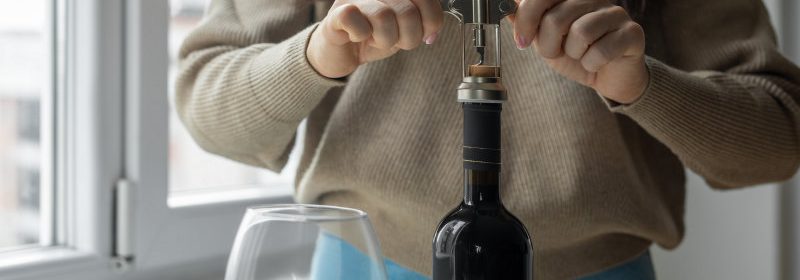How do I stop myself finishing a bottle of wine?

Save articles for later
Add articles to your saved list and come back to them any time.
Maybe it was the habit of lockdowns, maybe it’s the stress of work, or maybe it’s a desire to finish something once it’s started, but a lot of Australians don’t mind polishing off a bottle of wine after work.
Heavy drinking is seen as acceptable on many occasions, from weddings and sports games to children’s birthday parties and work functions. But it’s also part of people’s everyday lives, and for some it’s unhealthy.
You can have one or two glasses, but you don’t have to finish the bottle.Credit: iStock
″My relationship with alcohol in the past was not a healthy one,″ says Anjani Amriit, a leadership and women’s empowerment expert.
“The first 16 years of my working life were spent as a corporate lawyer in the top law firms in the UK and Australia. In the absence of any personal tools or strategies to manage the enormous pressure and responsibility that came with this role, I found myself following the lead of my male counterparts and using alcohol.
“From feeling like I was ‘fitting in’ with the typical drinking culture associated with overworked lawyers, over time alcohol became an unconscious, damaging habit. I used it to decompress and put myself to sleep after a very long stressful day at the office.
“At the time I was unaware of how it was disrupting my performance at work, my relationships at home and my health. Ultimately, I burned out.”
Overconsuming alcohol can also cause harm to the person who drinks and sometimes can be careless and dangerous to their loved ones.
Bree, who cannot be identified for legal reasons, had three children with her ex-husband. She says he was always drunk and it got worse after their first child was born.
“He was much worse than I expected. He never looked after children,” Bree says. “He started drinking when he was 20. He became very abusive after getting married.”
“Although he didn’t mean to hurt us physically, he pushed our toddler over whenever he got annoyed. I stayed with him for fifteen years until my children were old enough to look after themselves.”
The Australian Alcohol Guidelines recommend healthy adults drink a maximum of 10 standard drinks a week to cut the lifetime risk of harm from alcohol-related disease or injury, or a maximum of four standard drinks a day to reduce the risk of alcohol-related injury.
Amber Rules is a clinical specialist in supporting individuals and families impacted by addiction, and she says people can take control of their drinking.
There are ways to limit your alcohol usage.Credit: iStock
“Plan ahead and decide what your drinking limit is and stick to it. Pour your own drinks, make sure they are standard sizes and keep count of how many you drink,” she says.
″Have non-alcoholic drinks that are interesting and enjoyable so you can pace yourself and not feel as if you’re missing out.″
If you struggle with setting drinking limits and sticking to them, it’s important to reach out to a professional, Rules suggests.
Amriit says people don’t have to become teetotallers.
“I think the good news is, we don’t need to ‘break up’ with alcohol and go cold turkey to get results,” she says.
“It is important to recognise when we are using alcohol as a crutch to prop up areas of our life that we are struggling with as opposed to enjoying a glass of wine or a beer with friends or family or over a meal. The two are very different. A big part of my clients’ journeys to greater happiness and well-being and better performance includes learning how to foster a healthier relationship with alcohol.”
Still – according to the data from ABS Alcohol consumption, one in four Australians aged 18 years and over exceeded the Australian Adult Alcohol Guideline in 2020-21 (25.8 per cent). Men were more likely than women to exceed the guideline (33.6 per cent compared to 18.5 per cent).
Psychotherapist Eugenie Pepper says people worried about their drinking need to consider their mindset.
“You are in control of how much alcohol you drink. When you become more mindful about your drinking, you can change your attitude toward alcohol and drinking habits,” she says.
“You can create a set of new rules for drinking alcohol. You can plan ahead your drinking schedule. You choose your alcohol-free days. Choose the number of drinks you limit yourself to prior to social events.
“When you put something in writing you are much more likely to stick to it so write down your goal and maybe keep it with you. When planning how much you want to drink, be honest with yourself. What is your tipping point? That is the point when you stop caring. For some, it can be one or two drinks. Others can get away with more. If you don’t establish your tipping point all your planning can go out the window.”
Make the most of your health, relationships, fitness and nutrition with our Live Well newsletter. Get it in your inbox every Monday.
Most Viewed in Lifestyle
From our partners
Source: Read Full Article

